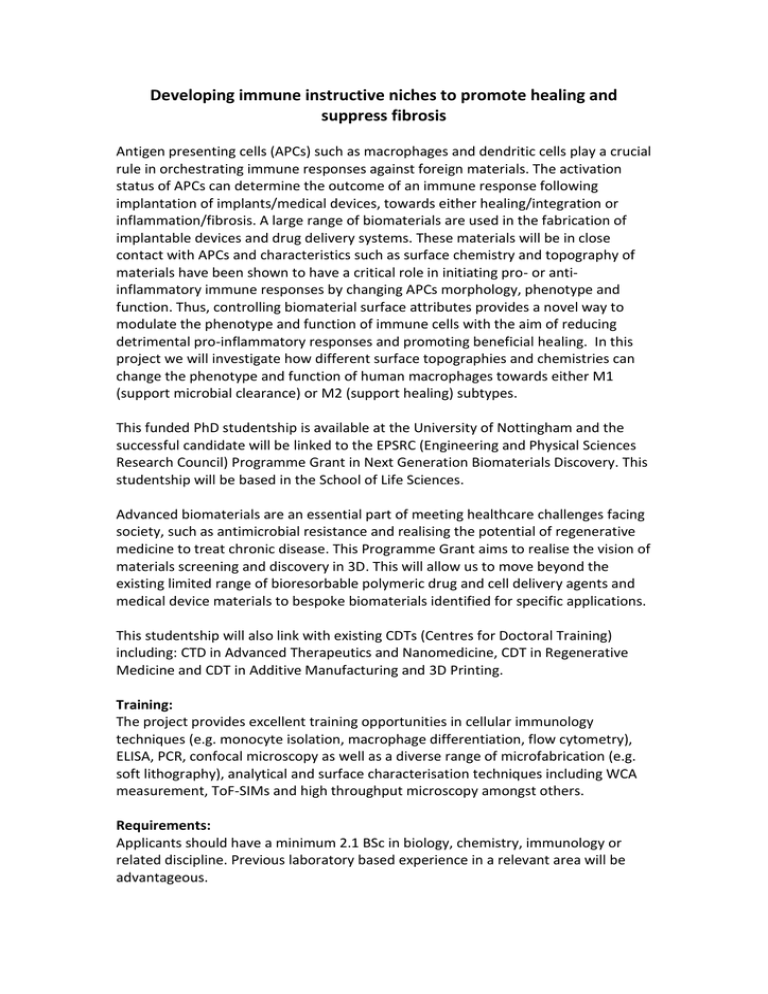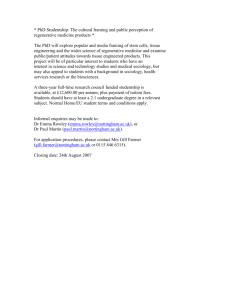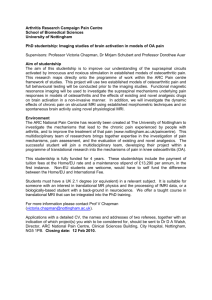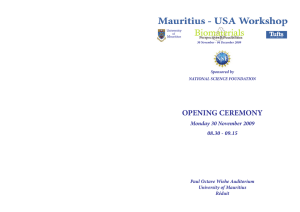Developing immune instructive niches to promote healing and suppress fibrosis
advertisement

Developing immune instructive niches to promote healing and suppress fibrosis Antigen presenting cells (APCs) such as macrophages and dendritic cells play a crucial rule in orchestrating immune responses against foreign materials. The activation status of APCs can determine the outcome of an immune response following implantation of implants/medical devices, towards either healing/integration or inflammation/fibrosis. A large range of biomaterials are used in the fabrication of implantable devices and drug delivery systems. These materials will be in close contact with APCs and characteristics such as surface chemistry and topography of materials have been shown to have a critical role in initiating pro- or antiinflammatory immune responses by changing APCs morphology, phenotype and function. Thus, controlling biomaterial surface attributes provides a novel way to modulate the phenotype and function of immune cells with the aim of reducing detrimental pro-inflammatory responses and promoting beneficial healing. In this project we will investigate how different surface topographies and chemistries can change the phenotype and function of human macrophages towards either M1 (support microbial clearance) or M2 (support healing) subtypes. This funded PhD studentship is available at the University of Nottingham and the successful candidate will be linked to the EPSRC (Engineering and Physical Sciences Research Council) Programme Grant in Next Generation Biomaterials Discovery. This studentship will be based in the School of Life Sciences. Advanced biomaterials are an essential part of meeting healthcare challenges facing society, such as antimicrobial resistance and realising the potential of regenerative medicine to treat chronic disease. This Programme Grant aims to realise the vision of materials screening and discovery in 3D. This will allow us to move beyond the existing limited range of bioresorbable polymeric drug and cell delivery agents and medical device materials to bespoke biomaterials identified for specific applications. This studentship will also link with existing CDTs (Centres for Doctoral Training) including: CTD in Advanced Therapeutics and Nanomedicine, CDT in Regenerative Medicine and CDT in Additive Manufacturing and 3D Printing. Training: The project provides excellent training opportunities in cellular immunology techniques (e.g. monocyte isolation, macrophage differentiation, flow cytometry), ELISA, PCR, confocal microscopy as well as a diverse range of microfabrication (e.g. soft lithography), analytical and surface characterisation techniques including WCA measurement, ToF-SIMs and high throughput microscopy amongst others. Requirements: Applicants should have a minimum 2.1 BSc in biology, chemistry, immunology or related discipline. Previous laboratory based experience in a relevant area will be advantageous. Funding: The funded PhD project will be undertaken for the full 4 years of PhD funding with concurrent transferable skills training, starting September 2016 (includes tax free stipend: £14,057 in 2015/16). Eligibility: This opportunity is available with stipend and fees payable to UK or EU candidates. Closing Date: The deadline is 30th April 2016. Interested applicants are strongly encouraged to make early contact with Amir Ghaemmaghami (Amir.Ghaemmaghami@nottingham.ac.uk) for more information and to send them a copy of your application. More information on the EPSRC Programme Grant can be found here http://tinyurl.com/BiomaterialsDiscovery To apply please complete the online application form available at http://www.nottingham.ac.uk/pgstudy/how-to-apply/how-to-apply.aspx including a CV and quoting “EPSRC PhD”.



